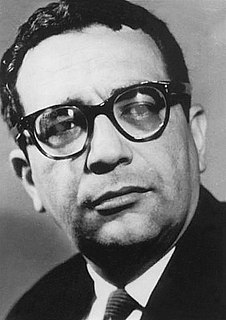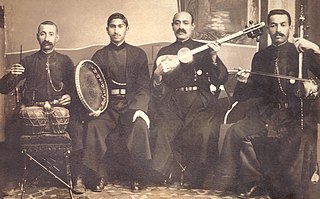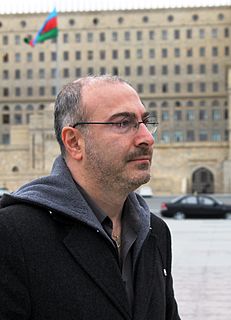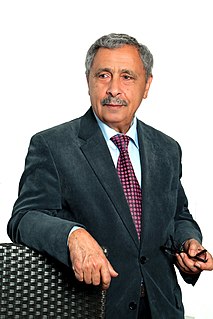
Much has been learned about early music in Norway from physical artifacts found during archaeological digs. These include instruments such as the lur. Viking and medieval sagas also describe musical activity, as do the accounts of priests and pilgrims from all over Europe coming to visit St Olaf's grave in Trondheim.

Gara Abulfaz oghlu Garayev, also spelled as Qara Qarayev or Kara Karayev, was a prominent Soviet Azerbaijani composer. Garayev wrote nearly 110 musical pieces, including ballets, operas, symphonic and chamber pieces, solos for piano, cantatas, songs, and marches, and rose to prominence not only in Azerbaijan SSR, but also in the rest of the Soviet Union and worldwide.

Fikret Mashadi Jamil oghlu Amirov was a prominent Azerbaijani composer of the Soviet period.

Mugham is one of the many folk musical compositions from Azerbaijan, contrasting with tasnif and ashik.

Tofig Alakbar oglu Guliyev was an Azerbaijani composer, pianist, and conductor.

The Hajibeyov Baku Academy of Music is a music school in Baku, Azerbaijan. It was established in 1920 in Baku and was previously known as the Hajibeyov Azerbaijan State Conservatoire.

Vagif Mustafazadeh, also known as Vaqif Mustafa-Zadeh, was an Azerbaijani jazz pianist and composer, acclaimed for fusing jazz and the traditional Azerbaijani folk music known as mugham. According to many world famous jazz musicians, Mustafazadeh is one of the pioneers and "the architect of jazz in Azerbaijan".

Albert Asriyan was a Soviet-Armenian violinist, composer, arranger and band leader.

The Azerbaijani jazz is a popular variety of jazz, widespread in Azerbaijan. It covers a broad range of styles and often features a blend with traditional Azeri music. Among modern famed Azeri jazz musicians are Aziza Mustafazadeh, who was influenced by Bill Evans and Keith Jarrett, Rain Sultanov, Isfar Sarabski, Shahin Novrasli.
Rafig Farzi oglu Babayev was an Azerbaijani jazz musician, composer, conductor, arranger, author of scores for films, and People's Artist of Azerbaijan (1993).

Rain Aladdin oglu Sultanov is an Azerbaijani jazz saxophonist and Honorary Artist of Azerbaijan.

“Gaya“ is an Azerbaijani vocal quartet consisting of Arif Hajiyev, Teymur Mirzoyev, Lev Yelisovetski and Rauf Babayev. Quartet was active from 1972 to 1988. They sang in multiple languages, including Azerbaijani, Spanish, Polish, Russian and English in their repertoire. Gaya was formed in 1961, when Rauf Hajiyev invited musicians to work in Azerbaijan State Estrada Orchestra. Such composers as Tofig Guliyev, Fikret Amirov, Rauf Hajiyev, Vasif Adigozalov, Faraj Garayev and Tofig Babayev worked with “Gaya”.
The International Mugham Center of Azerbaijan is a center of Azerbaijani arts and music aiming to promote, preserve and popularize the specific genre of Azerbaijani music, mugham. It is located in Baku Boulevard, in downtown Baku.

Gabala International Music Festival is an annual festival of classical music held every summer beginning in 2009 in Gabala, Azerbaijan. The festival is organised with the support of Heydar Aliyev Foundation at the initiative of the rector of the Baku Academy of Music Farhad Badalbeyli and conductor Dmitri Yablonski. At this festival, musicians perform in the open air. Participants have included musicians from Europe, the US and Israel, as well as musicians from republics of the former USSR. In 2009, a contest of young pianists was held at the same time with the musical festival. Jazz and mugham evenings were held along with classical music concerts. In 2010, the festival was held on August. General director of UNESCO Irina Bokova was in the opening ceremony of the festival. The festival began with the performance of overture from Uzeyir Hajibeyov's "Koroglu" opera as in 2009. Opening ceremony of the festival was charged to Royal Philarmonic Orchestra. Such musicians as Dmitri Yablonski, Yuri Bashmet, Khloe Khanslip and other Azerbaijani and foreign musicians took part in the festival. In 2011, the festival lasted from July 15 to August 5.
Alakbar Taghiyev was Azerbaijani composer and author of popular Azerbaijani songs.

The International World of Mugham Festival is an annual music festival of Azerbaijani mugham music.

Azerbaijani classical music includes a range of musical styles rooted in the traditions of Western or European classical music that European settlers brought to the country from the 20th century and onwards.
The festivals in Azerbaijan are held throughout the year in different regions of the country. The city of Baku is considered as the most important center of the festivals due to their scale and types. The festivals in each region, on other hand represent its own local characteristics mostly related to its food, fruit and so on.

Mammadagha Mammadali oglu Umudov is an Azerbaijani musician and composer. Distinguished Artist of the Azerbaijan Republic (2007).












